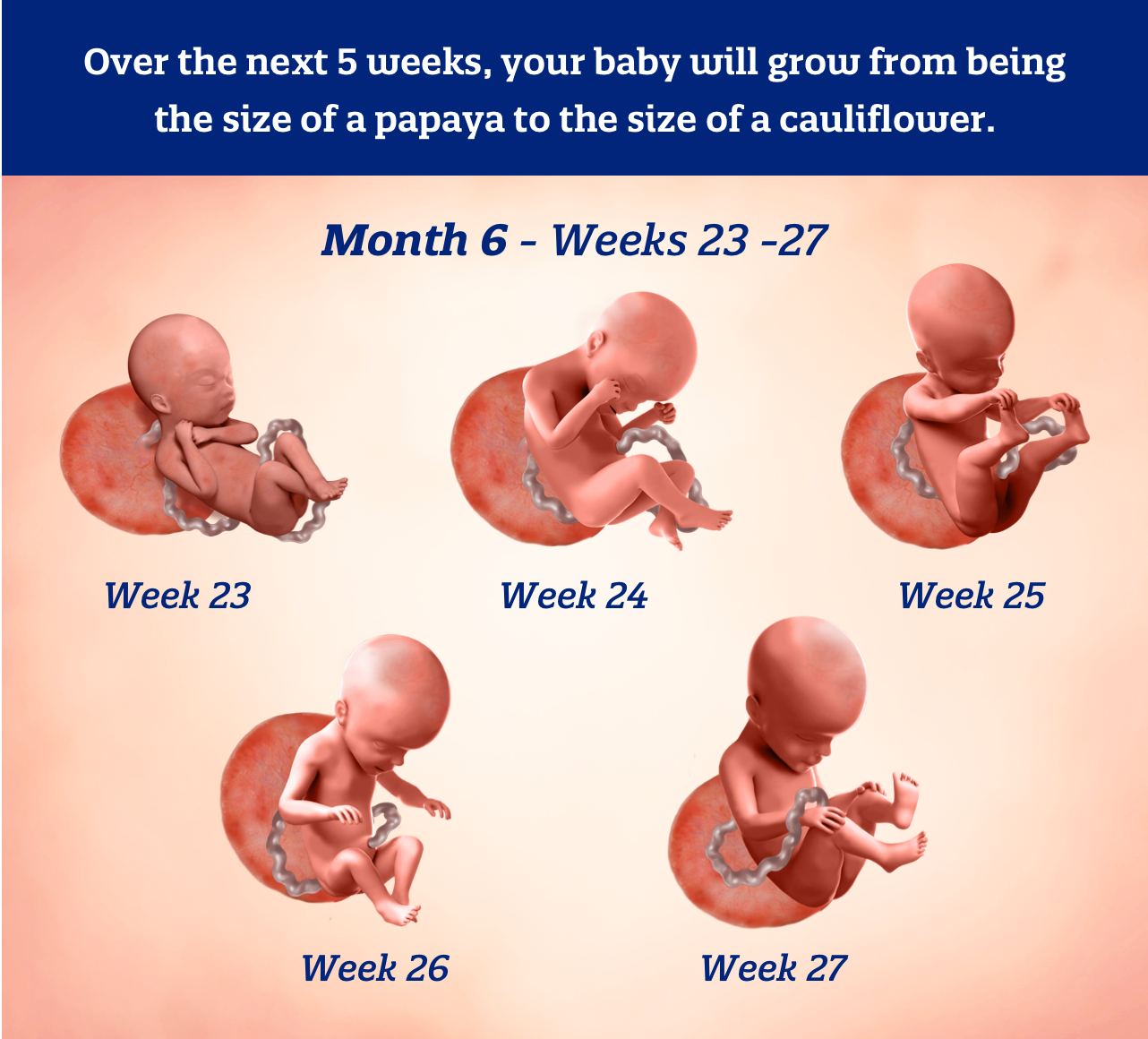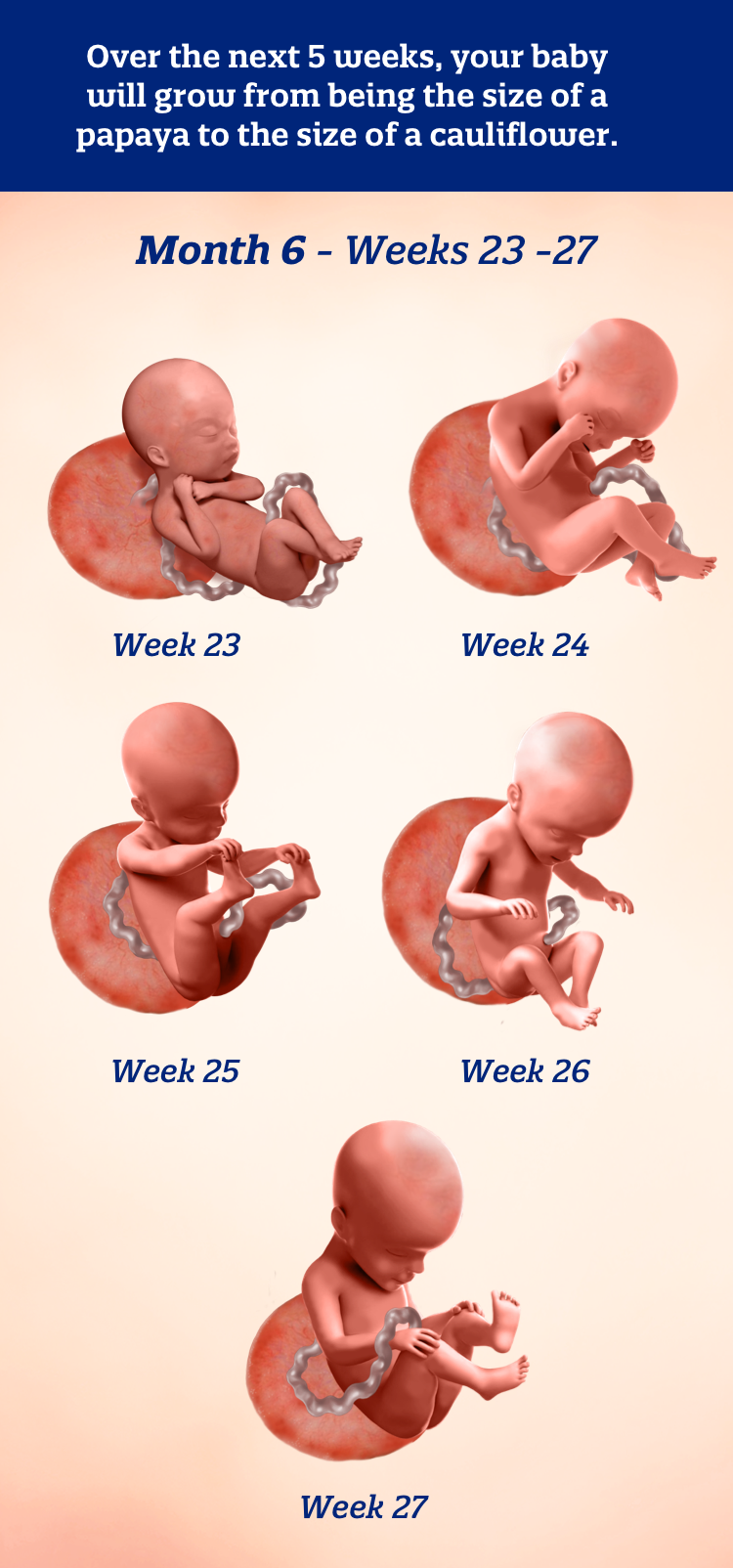

Find out what could be on the horizon for you and your baby during your sixth month of pregnancy.
At 6 months pregnant, you’re winding down your second trimester. Mamas-to-be may be experiencing some discomforts such as body aches and swollen feet, as well as incredibly special moments like feeling those sweet baby kicks. Here’s a look at some of the things you could expect during weeks 21–24.
Your lower back, hips, and pelvis may start aching as your belly grows, putting pressure on ligaments as extra weight shifts your center of gravity. Taking a warm bath, practicing good posture, and wearing comfortable, low-heeled shoes may ease some discomfort.
Regular exercise, such as walking and gentle stretching—with your doctor’s OK—can help keep your body strong and flexible. You may also want to consider using a pregnancy belly band for extra support.
If your shoes fit a bit tighter these days, it could be because your feet and ankles are swollen. That’s right, it’s not just your belly that’s growing. Body changes and hormones may contribute to this not-so-swell swelling. Hormones may also be relaxing your foot’s tendons and ligaments, widening your feet.
If you’re dealing with foot swelling and achiness, try to stay off your feet as much as possible, consider wearing compression stockings or supportive tights, avoid standing for long periods, and elevate your feet when resting. Talk to your doctor if you are concerned about any foot swelling or pain.
Braxton Hicks contractions, sometimes called “false labor,” are unpredictable, irregular, and uncomfortable uterine contractions that last for 15 seconds and up to two minutes. They aren’t actual labor but are believed to be your body’s way of preparing for the real deal.
How can you tell the difference between Braxton Hicks contractions and true labor? Unlike actual labor, Braxton Hicks contractions won’t increase in intensity or frequency. They may be triggered by dehydration or vigorous activity by baby or mom. While Braxton Hicks contractions typically occur during the third trimester, you could feel them now.
If you experience these “practice” contractions, try drinking water, resting, or changing positions, which may help them stop. If you have any concerns or are worried you may be in actual labor, contact your doctor right away.
If you’re having fewer bowel movements, with firm or hard-to-pass stools, you could be dealing with constipation. This common pregnancy concern, often accompanied by bloating, can be due to the hormones and your growing baby’s pressure on your bowel. Another potential culprit is the iron in your prenatal vitamins, which has been associated with constipation.
To help move things along, try to incorporate more fiber-rich foods into your diet, such as whole grains, beans, fruits, and vegetables. Consuming plenty of water, soups, teas, and fruit juice may also help stimulate the colon.
Every mama-to-be is different, but during your sixth month of pregnancy, you may also experience dizziness, leg cramps, and skin changes. You may develop dark splotchy areas on your face, and breast changes and vaginal discharge may continue until delivery. But since you might be feeling pretty good compared to the first trimester, you may also have an increased appetite and cravings may kick into high gear.
Belly size can vary from woman to woman. By 6 months, you will likely be noticeably pregnant...or possibly not. You may look smaller if it is your first pregnancy, if you have strong abdominal muscles, or if your baby is in a certain position. If your belly is protruding, your belly button may as well.


At 6 months pregnant, your fetus is going through a growth spurt. Your baby’s lungs are formed but still developing, their brain is gaining weight, and fat reserves are growing.
Those little kicks you may have started to feel last month are not so little any more; they may feel quite strong now, accompanied by jabs and punches. And while your nugget is now about the size of a papaya, they still have wiggle room in the womb.
At 6 months pregnant, your baby and your body are reaching new milestones every week. Enfamil Family Beginnings can help you get ready for the amazing changes pregnancy and parenthood will bring. It’s the perfect resource for new and expecting moms. Save on Enfamil products, track your bump and baby’s growth, and get helpful articles each week relevant to your journey. Join now.
All information on Enfamil, including but not limited to information about health, medical conditions, and nutrition, is intended for your general knowledge and is not a substitute for a healthcare professional's medical identification, advice, or management for specific medical conditions. You should seek medical care and consult your doctor or pediatrician for any specific health or nutrition issues. Never disregard professional medical advice or delay seeking medical treatment, care, or help because of information you have read on Enfamil.